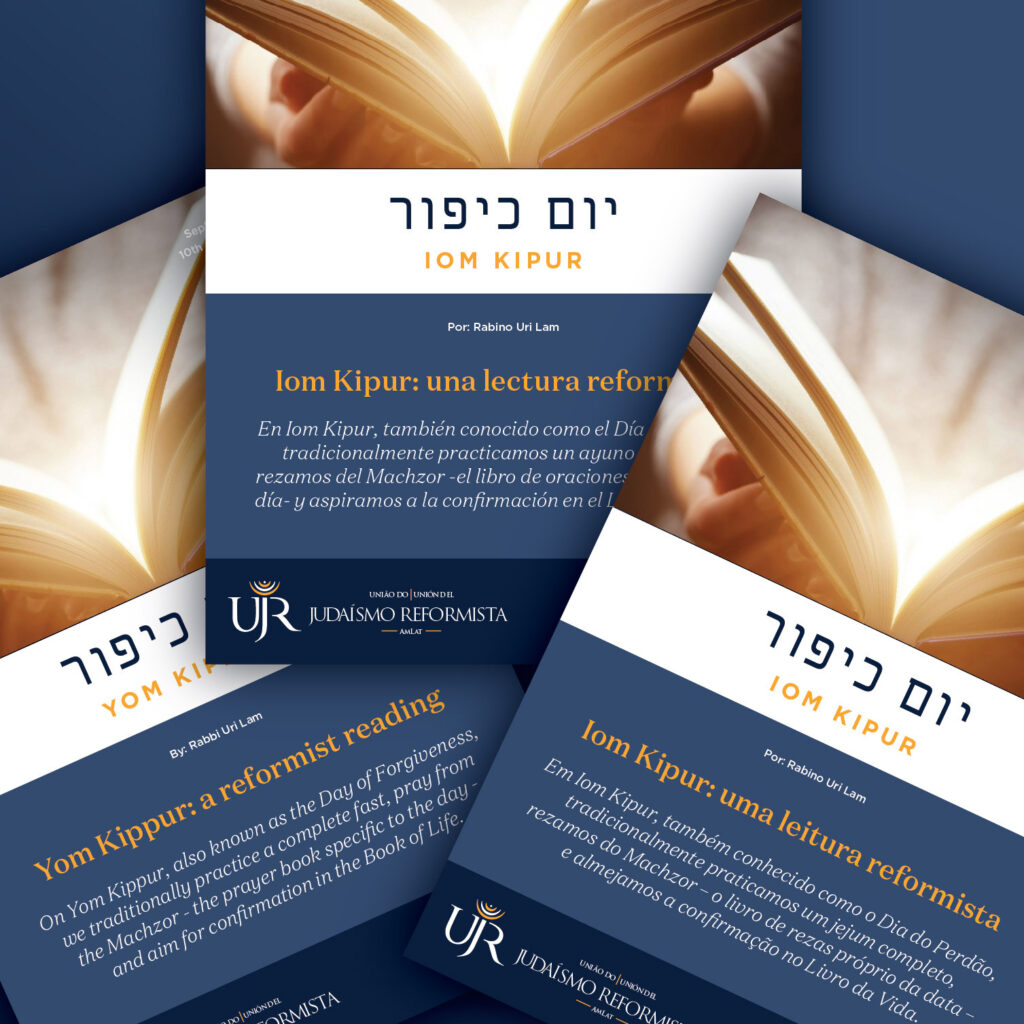Yom Kippur
יום כיפור
September 24-25
10th of Tishrei 5784
Rabbi Uri Lam
Yom Kippur: A Reform Reading
Rabbi Uri Lam
On Yom Kippur, also known as the Day of Forgiveness, we traditionally practice a complete fast, pray from the Machzor – the prayer book specific to the day – and aim for confirmation in the Book of Life. The discomfort of fasting, coordinated with the content of the prayers, can lead us to another state of consciousness: pain brings us closer to the pain of others; the recognition of our individual and collective transgressions offers the opportunity to empathize with the hurt we have caused our fellow human beings. The fragility we feel provokes us to act differently in the new year. Yom Kippur is a day to afflict our souls, as written in the Torah: “On the tenth day of this seventh month is Yom haKippurim and it shall be a holy summons to you: afflict your souls…” (Leviticus 23:27)
The more concentrated we are, the more the experience will be recorded in our Book of Life. A light Yom Kippur will leave little mark; only remarkable experiences change lives.
One way to get involved with Yom Kippur is to be conscious of the prayers we say. On the night of Kol Nidrê, a short prayer serves as a lantern: “Or zarúa latzadik – the light is sown for the righteous…” (Psalm 97:11). The day will be stressful, but the light has already been sown and joy is inherent to those with pure hearts. It’s up to us to keep the light alive and not let the joy fade. With this spiritual direction, our meditation will be focused on a transformative and meaningful day, through which we will once again be clear sources of light and goodness.
As for the Torah readings, historically the main reading for Yom Kippur morning is in Leviticus (16:1-34). According to the Torah – A Modern Commentary (p. 769), “this passage specifies an elaborate procedure for the annual maintenance of the ritual purity of the sanctuary. At the risk of his life, the high priest first makes atonement for himself and his household, and then for the entire community.” The orientation is hierarchical: the innermost place of the Sanctuary, the Tent of Meeting and the altar; atonement for the priestly family and, finally, for all the people (cf. Lev. 16:33).
The reading in the Reform synagogues (Nitzavim: Deut. 29:9-30:20) focuses on inclusion: the Covenant is between God and all the people: men, women and children, leaders and simple people, Jews and foreigners. The hierarchy gives way to the horizontalization of the relationship between each person and God.
But the main change from the Reform rite to the traditional one on Yom Kippur is in the reading of the Torah during the afternoon prayers. While historically we read the passage that speaks of sexual relations considered forbidden (Lev. 18:1-30), the Reform tradition moves on to the next chapter (Lev. 19:1-18), which calls us to seek kedushah, holiness, through actions of respect for the human being, such as: respecting one’s mother and father, not stealing, not deceiving, not insulting the deaf or causing the blind to stumble, among others. The change is not even subtle: in a day of so much spirituality, instead of going down to the most intimate physical relationships in search of the worst transgressions, we rise spiritually in search of holiness. This reading also helps us to reflect on what attitudes we should have towards forms of intolerance in our times, such as racism and homophobia, for example.
In addition to the Torah readings, Yom Kippur is marked by a series of special prayers, such as the Vidui (confessions) and the piutim – liturgical poems – of the Neilah, at the close of Yom Kippur. At this end, in the transition from tiredness, hunger and thirst to confirmation in the Book of Life, the prayers gradually lose their melancholy tone and gain joy and hope.
At the end of Yom Kippur, the triumphant blowing of the Shofar, with communities full of men and women of all ages, without distinction, often covered with a tent of talitot stretched out – indicate to us that confirmation in the Book of Life is not an individual achievement, but a collective one; and that having one’s name inscribed in this book is not the final goal, but the initial one. Let life come: we are ready and prepared for it.
Uri Lam is the Rabbi of the Israelite Congregation “Temple Beth-El” and the current president of the CRRB (Reform Rabbinical Council of Brazil).





